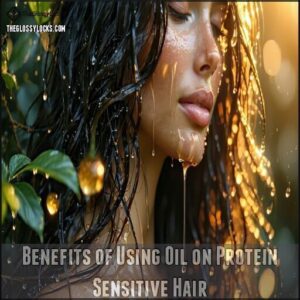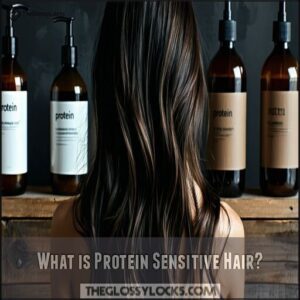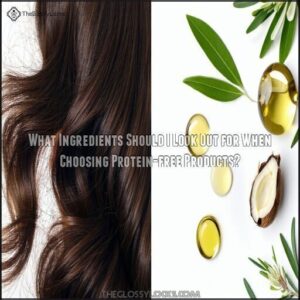This site is supported by our readers. We may earn a commission, at no cost to you, if you purchase through links.
 If you’re struggling with protein sensitive hair, castor oil might be your new best friend.
If you’re struggling with protein sensitive hair, castor oil might be your new best friend.
Unlike many hair products, castor oil contains no protein – only beneficial fats and omega-6 fatty acids that nourish without triggering protein overload.
You’ll find it helps seal moisture while strengthening your strands without the dreaded stiffness or breakage that protein-rich products can cause.
Apply a small amount to damp hair, focusing on ends and problem areas. Start with just once weekly – a little goes a long way with this thick oil.
The right application technique can transform your hair care routine from frustrating to fabulous.
Table Of Contents
- Key Takeaways
- Benefits of Using Oil on Protein Sensitive Hair
- How to Use Castor Oil on Protein Sensitive Hair
- Alternatives to Castor Oil
- What is Protein Sensitive Hair?
- How Do I Know if I Have a Protein Overload in My Natural Hair?
- Why Should I Use Protein-free Products?
- Can Low Porosity Hair Benefit From Protein-free Hair Products?
- What Ingredients Should I Look Out for When Choosing Protein-free Products?
- Does Coconut Oil Contain Proteins?
- Recommended Protein-free Deep Conditioners:
- Curlsmith Double Cream Deep Quencher
- As I Am Hydration Elation Intensive Conditioner
- TGIN Honey Miracle Hair Mask
- Camille Rose Naturals Moroccan Pear Conditioning Custard
- Alikay Naturals Avocado Moisture Repairing Mask
- Eden BodyWorks Jojoba Monoi Deep Conditioner
- TPH by Taraji Mask on Moisturizing Conditioning Mask
- Frequently Asked Questions (FAQs)
- Does castor oil work on low porosity hair?
- Does castor oil help with the growth of a beard?
- Does castor oil improve hair elasticity?
- How to use castor oil on hair?
- Does castor oil stimulate hair growth?
- How to use castor oil for hair growth & thickness?
- What are the Benefits of Using Oil on Protein Sensitive Hair?
- How Do I Use Castor Oil on Protein Sensitive Hair?
- Are there Alternatives to Castor Oil?
- How Can I Test for Protein Sensitivity?
- Conclusion
Key Takeaways
- You’ll benefit from castor oil if you have protein sensitive hair as it contains no protein—only beneficial fats and omega-6 fatty acids that nourish without triggering protein overload.
- You can apply castor oil by warming a small amount, focusing on your ends and problem areas, and using it just once weekly—remember that a little goes a long way with this thick oil.
- You should look for alternatives like jojoba, olive, or almond oil if castor oil isn’t working for your protein sensitive hair, as each offers unique benefits to combat dryness and brittleness.
- You’ll know your hair is protein sensitive if it feels stiff, brittle, or breaks easily after using protein-rich products—signs that indicate you need moisture-focused treatments rather than protein.
Benefits of Using Oil on Protein Sensitive Hair
Oils work wonders for protein-sensitive hair by restoring moisture, enhancing shine, and reducing breakage.
Castor oil is a superstar for hydration without overloading proteins, making it ideal for sensitive strands.
Its natural properties help repair damage, improve scalp health, and boost hair moisture.
Unlike coconut oil, which can cause brittleness, castor oil offers a safer and protein-free alternative.
Regular use leaves your hair soft, resilient, and shiny.
Opt for high-quality, sulfate-free products to maximize these hair benefits and protect fragile hair effectively.
How to Use Castor Oil on Protein Sensitive Hair
Applying castor oil to protein-sensitive hair is simple if you follow a few tips:
- Warm a small amount of castor oil slightly for better absorption.
- Dilute it with a carrier oil like almond or jojoba to reduce heaviness.
- Massage into your scalp and dry hair, especially the ends, to restore moisture.
- Perform a patch test beforehand to check for irritation or sensitivity.
Wash thoroughly with clarifying shampoo afterward for easy oil removal while maintaining scalp health and ideal hair moisture.
Many users find castor oil products beneficial for hair care.
Alternatives to Castor Oil
If castor oil isn’t working for your protein-sensitive hair, there are plenty of alternative oils to explore.
Each option brings unique benefits to tame dryness and brittleness.
- Jojoba oil mimics your scalp’s natural oils, balancing hydration without leaving your hair greasy. It’s lightweight and perfect for sensitive strands.
- Olive oil adds shine and softness, thanks to its fatty acids. It also has anti-inflammatory properties that soothe the scalp while moisturizing.
- Almond oil nourishes dry hair with its rich blend of vitamins and fatty acids, helping your strands feel smooth and flexible.
Argan oil is another excellent choice. Packed with vitamin E, it strengthens your hair while staying lightweight.
Many people use jojoba oil products for hair care. Try these alternative oils to keep your protein-sensitive hair healthy, hydrated, and feeling its best.
What is Protein Sensitive Hair?
Protein-sensitive hair struggles with products containing protein, often becoming dry, stiff, or brittle.
Nourish hair without the rigidity. Protein-sensitive strands need moisture, not protein, to thrive with flexibility and shine.
If your hair feels crunchy or hard after using a product, this may signal protein sensitivity.
Common causes include low porosity, where tightly packed cuticles make moisture absorption tricky, and protein buildup, causing hair to lose flexibility.
To manage this, pay attention to how your hair reacts to products.
Swap protein-rich ones for moisture-focused options, like oils or protein-free deep conditioners, to keep your hair hydrated and balanced without risking protein overload.
High porosity hair, however, can also experience sensitivity because of excessive protein absorption.
How Do I Know if I Have a Protein Overload in My Natural Hair?
Does your hair feel stiff or snap easily? These stiffness indicators could point to protein overload.
Protein-sensitive hair reacts by becoming brittle, dull, and resistant to product absorption.
- Breakage signs: Strands break with the slightest pull, and you might notice more split ends.
- Hair texture issues: Hair feels hard and rough, despite moisturizing.
Combat this by using moisture-rich products like CURLSMITH Double Cream Deep Conditioner.
A key step is understanding hair’s porosity levels to optimize product absorption.
Avoid protein-heavy formulas and focus on scalp health.
Restoring balance can prevent further issues and rejuvenate your hair’s elasticity.
Why Should I Use Protein-free Products?
Striking the right moisture-protein balance is essential for protein-sensitive hair.
Protein-free products, like castor oil, help avoid protein overload, a common cause of hair stiffness and breakage.
These products hydrate strands, promoting softness and better product absorption.
Many users find castor oil products beneficial for hair care.
Think of it as giving your hair a drink without a "protein hangover."
| Benefit | Protein-Free Products |
|---|---|
| Avoid protein overload | Gentle on sensitive hair |
| Improve hydration | Better moisture retention |
| Prevent breakage | Strengthens without stiffness |
| Enhance flexibility | No hardening effects |
| Promote absorption | Hair feels soft and manageable |
Can Low Porosity Hair Benefit From Protein-free Hair Products?
Yes, low porosity hair can definitely benefit from protein-free hair products.
When your hair cuticles lie flat and tight, they struggle to absorb moisture but can easily become overloaded with protein.
Protein-free products help maintain the delicate moisture-protein balance your locks crave.
Since low porosity needs focus more on hydration than strength, oil-based products without protein work wonders.
They coat the hair shaft without adding bulk or causing stiffness.
Castor oil stands out as an excellent choice because it delivers deep moisture while improving product absorption rates, giving your protein sensitive hair exactly what it needs—hydration without heaviness.
What Ingredients Should I Look Out for When Choosing Protein-free Products?
When selecting protein-free products for sensitive hair, carefully reading ingredient labels becomes your hair’s best defense against unwanted protein overload.
- Avoid hydrolyzed proteins, amino acids, and keratin which can trigger brittleness in protein sensitive hair
- Look for nourishing ingredients like jojoba oil, olive oil, and castor oil that provide moisture without protein
- Choose products specifically labeled "protein-free" for guaranteed safety
Product labels can be tricky territory, with hidden proteins lurking under scientific names. For those struggling with protein sensitivity, a thorough ingredient analysis before purchasing helps prevent further damage to your delicate strands.
Does Coconut Oil Contain Proteins?
Contrary to what you might’ve heard, coconut oil contains absolutely no proteins.
Coconut oil is pure fat—zero proteins—yet it still brilliantly protects your hair’s natural protein structure.
The coconut oil composition is 100% fat, primarily lauric acid, making it safe for protein sensitive hair.
While coconut oil won’t add protein to your hair, research shows it helps prevent protein loss better than other oils.
It works by strengthening existing hair proteins from within, offering protection without risking protein overload, and your hair still maintains its natural flexibility and moisture balance.
If castor oil isn’t working for you, coconut oil could be a worthy alternative, as it can also act as an occlusive barrier, sealing moisture within the hair.
Recommended Protein-free Deep Conditioners:
You’ll find these protein-free deep conditioners perfect for your sensitive strands that crave moisture without the stiffness.
They’ll restore softness and manageability to your hair while keeping protein overload at bay.
Curlsmith Double Cream Deep Quencher
Curlsmith Double Cream Deep Quencher delivers intense moisture to protein sensitive hair without unwanted protein content.
This nourishing treatment features a thick, buttery texture enriched with Andiroba and Resurrection Flower specifically chosen to quench thirsty locks.
The formula contains lightweight oils packed with Vitamin E and fatty acids that add shine and softness while maintaining your hair’s protein-moisture balance.
Perfect for ultra-dry, dull hair needing transformation without heaviness.
As I Am Hydration Elation Intensive Conditioner
The As I Am Hydration Elation Intensive Conditioner stands out as a protein-free solution for hair struggling with protein sensitivity.
This lightweight yet deeply nourishing treatment balances your hair’s moisture without adding unwanted proteins.
Three reasons users love this conditioner:
- Soothes scalp irritation while reducing breakage
- Penetrates deeply without causing protein overload
- Creates noticeably softer curls after just one use
Its natural extracts work together to combat hair breakage while maintaining maximum hydration efficacy and providing a deeply nourishing treatment to create softer curls.
TGIN Honey Miracle Hair Mask
The TGIN Honey Miracle Hair Mask offers a protein-free solution for your protein sensitive hair concerns.
This deep conditioning treatment transforms dry, damaged strands with raw honey and nourishing oils.
| Feature | Benefit | Best For |
|---|---|---|
| Raw Honey | Softens & adds shine | All hair types |
| Jojoba Oil | Nourishes & heals | Damaged hair |
| Olive Oil | Repairs & strengthens | Color-treated hair |
| Sulfate-free | Prevents moisture loss | Protein sensitivity |
| Heat-activated | Deeper penetration | Extra dry hair |
Apply generously after shampooing, leave for 35-60 minutes, then rinse thoroughly for softer, healthier hair without protein overload, making it ideal for those with protein sensitivity.
Camille Rose Naturals Moroccan Pear Conditioning Custard
Curly-haired enthusiasts seeking refuge from protein overload will find the Moroccan Pear Conditioning Custard a game-changer for protein sensitive hair.
Its luxurious buttercream base delivers moisture without triggering sensitivity. Many users find that it can help reduce frizz.
- Product Performance exceeds expectations with its protein-free formula
- Ingredients Analysis reveals vitamin-rich extracts (A,B,C,D & K)
- Pear Scent offers a delightful sensory experience
- Custard Consistency penetrates deeply without weighing hair down
- User Reviews consistently praise its ability to maintain moisture balance
The combination of these features makes the Moroccan Pear Conditioning Custard an excellent choice for those with protein sensitive hair, providing a delightful sensory experience while effectively managing moisture balance.
Alikay Naturals Avocado Moisture Repairing Mask
While Moroccan Pear Conditioning Custard offers rich omega fatty acids, the Alikay Naturals Avocado Moisture Repairing Mask delivers a different approach for protein-sensitive hair.
This light, rejuvenating mask repairs damaged strands without protein overload.
| Feature | Benefit for Protein-Sensitive Hair |
|---|---|
| Avocado oil | Nourishes without protein buildup |
| Natural remedy | Restores moisture and shine |
| Improved elasticity | Less breakage, more length |
| Vitamin-rich formula | Strengthens without hardening |
Apply generously to clean, damp hair for 30 minutes before rinsing thoroughly.
Eden BodyWorks Jojoba Monoi Deep Conditioner
After pampering your locks with avocado goodness, let’s explore another protein-free gem.
Eden BodyWorks Jojoba Monoi Deep Conditioner offers a protein-sensitive solution that won’t trigger brittleness or breakage.
This ultra-thick treatment delivers:
- Improved elasticity without protein overload
- Restored hair health through essential nutrients
- Enhanced texture with reduced breakage
The botanical blend works like therapy for damaged tresses, strengthening hair shafts while maintaining the perfect moisture-protein balance for sensitive strands, which is crucial for improved elasticity and restored hair health.
TPH by Taraji Mask on Moisturizing Conditioning Mask
Moving from Eden’s jojoba formula to TPH by Taraji’s Mask On Moisturizing Conditioning Mask offers another excellent option for protein sensitive hair.
This hydrating treatment delivers intense moisture without protein buildup that can cause brittleness.
Apply to damp hair, focusing on ends, and let it work its magic for 15-20 minutes.
Users report softer, more manageable curls after just one use, which can be a significant benefit for those seeking to improve their hair’s manageability.
Frequently Asked Questions (FAQs)
Does castor oil work on low porosity hair?
Like a gentle key opening a stubborn door, castor oil works well on low porosity hair.
It’s lightweight enough to penetrate tight cuticles while providing moisture without protein that could cause brittleness.
Does castor oil help with the growth of a beard?
Castor oil may support beard growth by improving blood circulation to hair follicles.
It’s rich in fatty acids that nourish your skin and potentially stimulate hair follicles, though scientific evidence remains limited.
Does castor oil improve hair elasticity?
Smooth as silk, you’ll find castor oil improves your hair’s elasticity by deeply moisturizing strands without adding protein.
It’s rich in fatty acids that nourish and strengthen hair while maintaining flexibility.
How to use castor oil on hair?
To use castor oil on hair, warm a small amount in your hands.
Apply to dry hair from roots to ends, leave on for 1-2 hours.
Then shampoo twice to remove residue completely.
Does castor oil stimulate hair growth?
While research suggests castor oil may improve scalp circulation, scientific evidence for hair growth stimulation remains limited.
You’ll find it can nourish your follicles and potentially support growth when applied regularly, which may help with hair growth stimulation.
How to use castor oil for hair growth & thickness?
For thicker, healthier hair, warm a small amount of castor oil, massage it into your scalp, and spread it to the ends.
Let it sit for 1-2 hours, then shampoo thoroughly to remove.
What are the Benefits of Using Oil on Protein Sensitive Hair?
Oils provide moisture without adding protein to your hair.
They’ll nourish dry strands, reduce breakage, and improve manageability.
While preventing the stiffness and brittleness that protein products can cause in sensitive hair.
How Do I Use Castor Oil on Protein Sensitive Hair?
Warming castor oil, apply sparingly to dry hair focusing on ends. Leave for 1-2 hours, then double shampoo. For protein-sensitive hair, limit to weekly treatments and patch test first.
Are there Alternatives to Castor Oil?
You’ll find jojoba, olive, almond, argan, and avocado oils work well for protein-sensitive hair.
These alternatives provide moisture without protein buildup.
Try them one at a time to see what works best for you.
How Can I Test for Protein Sensitivity?
Apply a protein-rich conditioner to a small section of damp hair. Let it dry naturally. If your hair feels stiff, brittle, or straw-like afterward, you’re likely protein-sensitive.
Conclusion
Ready to transform your hair care routine?
Managing protein sensitive hair doesn’t have to be complicated. Castor oil offers a protein-free solution that strengthens and moisturizes without triggering overload symptoms.
You’ll notice improved elasticity and shine as you incorporate this thick, nourishing oil into your weekly regimen.
Start with small amounts, be consistent, and adjust based on your hair’s response.
Your journey to healthier, balanced castor oil protein sensitive hair starts with that first application.











